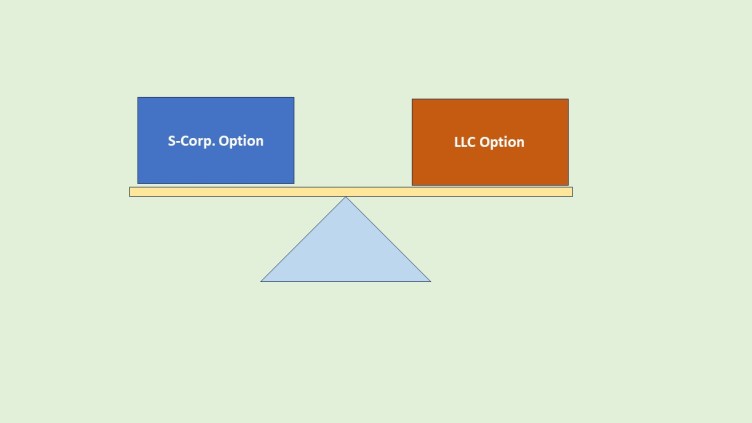LLC Vs. S-corp.
Starting and running a small business is a challenging venture, and understanding the tax implications is crucial for its success. One of the most significant decisions a small business owner faces is choosing the right legal structure.
For many entrepreneurs, the choice boils down to forming a Limited Liability Company (LLC) or electing S-Corporation (S-Corp) status. We’ll evaluate the benefits of each option and discuss key considerations for small business owners. We will help you answer set the best tax strategies by evaluating: LLC vs. S-corp.
LLC and business liability
Limited Liability Companies, or LLCs, are a popular choice among small business owners because they provide personal liability protection. This means that the business owner’s personal assets are typically shielded from business-related debts and lawsuits. In the event of legal trouble or financial issues, your personal assets such as your home or savings are generally safe. It is important to highlight that LLC do not provide tax benefits on their own merits. An LLC must elect the S-Corp. status for the taxpayer to realize some benefits.
S-Corp. – Reducing Self-Employment Tax
On the other hand, S-Corporation is not a legal form it is a tax status and it is chosen primarily for tax savings. S-Corps allow business owners to reduce their self-employment tax burden. Self-employment tax covers both the employee and employer portions of Social Security and Medicare taxes, and this can be significant for small business owners who are sole proprietors or partners. By electing S-Corp status, a business owner can divide their income into two parts: salary and dividends. The salary is subject to self-employment tax, but the dividends are not. This allows business owners to potentially save on self-employment tax (only on dividends).
But can I classify all their income as dividends and avoid self-employment taxes? The IRS does not allow that, actually taxpayers who attempt this run the risk of making all their income subject to self-employment taxes.
It is important to highlight that that the self-employment tax rate is 15.3% (12.4% for Social Security and 2.9% for Medicare) on self-employment income up to the Social Security earnings cap. If your self-employment income exceeds the cap, which is expected to reach $160,200 for 2023 (Yes, it may vary from one year to another), you will still be subject to the 2.9% Medicare tax on the entire income. Accordingly, the highest savings are realized if a tax payer makes an annual income close this cap.
The tax savings are less if the annual income is significantly lower that the cap (because the reasonable salary will be too low to realize any benefits) or if the income is way higher than this cap because in this case the reasonable salary may be higher than the cap itself! In this latter scenario the benefits still exist but it will have a lower impact because the taxpayer has already reached the cap for SS tax anyway, so instead of saving the full 15.3% the tax payer will only safe the 2.9% Medicare portion.
LLC vs.S-Corp Election
It’s important to note that business owners need to form an LLC before they can elect S-Corp status. An LLC is the base structure, and you can then choose S-Corp taxation by filing the necessary paperwork with the IRS. This combination provides the liability protection of an LLC while taking advantage of the potential tax savings offered by S-Corp status.
Determining a Reasonable Salary
One key factor in maximizing the tax benefits of S-Corporation status is setting a reasonable salary for yourself as the business owner. The IRS requires that S-Corp owners pay themselves a reasonable salary, meaning a wage that reflects what they would earn for the same job in a similar industry. The salary also needs to be proportionate with the total income. If you set your salary too low, so you could lower your self-employment liability, you could attract unwanted attention from the IRS, potentially triggering an audit.
The Qualified Business Deduction (QBI) Complexity
The Tax Cuts and Jobs Act introduced the Qualified Business Deduction (QBI) offers a significant tax break for pass-through entities, including S-Corps. However, the QBI deduction adds another layer of complexity when determining a reasonable salary. The QBI deduction allows eligible businesses to deduct up to 20% of qualified business income, making the decision of how much to pay yourself even more important.
To put things in perspective, tax payer may saves15.3% on any portion of the income that is designated as a salary but is that case s/he is foregoing the 20% QBI deduction on that salary. Before you jump to the conclusion that 20% is better than 15.3%, remember that the benefits associated with the 20% deduction depend on the tax bracket for the taxpayer, while the 15.3% is actual savings. So, a good CPA needs to crunch numbers and do scenario analysis to help the client decide to elect the S-Corp. status or remain as an LLC.
Seeking Professional Advice for best tax strategies
In conclusion, the variables involved in deciding between an LLC and electing S-Corp status, as well as determining a reasonable salary, can make the decision challenging for business owners. This is where seeking the advice of a tax professional becomes crucial. A tax professional can provide personalized guidance based on your business’s unique circumstances, helping you navigate the tax code, maximize your tax benefits, and ensure compliance with IRS regulations.
By Ryan Osman, CPA, MBA https://www.linkedin.com/in/raafat-osman-cpa-mba-b0991423/
Tax Strategies Tax Strategies LLC vs. S-corp. LLC vs. S-corp. LLC vs. s-corp.
Still can’t decide on LLC vs. S-corp.? Count on us as your steadfast ally. Schedule your complimentary consultation today and experience our unwavering commitment to your financial success.


